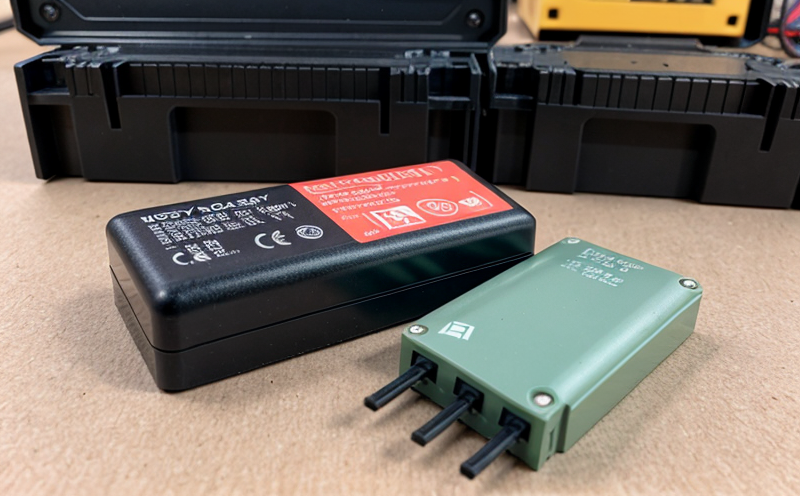UNE EN 62259 Nickel-Cadmium Battery Module Performance Testing
The UNE EN 62259 standard is specifically designed for nickel-cadmium (NiCd) battery modules, which are widely used in critical applications such as medical devices, emergency lighting systems, and industrial power supplies. This standard ensures that NiCd batteries meet stringent performance criteria to guarantee safe, reliable operation under various environmental conditions.
The testing procedures outlined in UNE EN 62259 cover a range of parameters including internal resistance measurement, temperature cycling, charge/discharge cycles, and endurance tests. These tests are essential for ensuring that the battery modules meet the required safety standards, durability, and performance specifications.
Internal resistance is a key metric in NiCd batteries as it directly impacts the battery's efficiency and longevity. The standard specifies precise methods for measuring internal resistance under different load conditions to ensure consistent performance throughout the battery’s lifecycle. Temperature cycling tests simulate real-world environmental variations that the battery may encounter during use, ensuring its reliability across temperature extremes.
Charge/discharge cycles are another critical aspect of UNE EN 62259 testing. The standard specifies the number and duration of charge/discharge cycles to evaluate the battery's capacity retention over time. This ensures that the battery maintains its initial performance levels even after repeated charging and discharging cycles, which is crucial for applications where the battery must operate continuously or under frequent use.
Endurance tests, often referred to as high-temperature storage tests (HTST), are used to assess the battery's ability to withstand long-term storage in harsh conditions. These tests simulate extended periods of non-use and ensure that the battery remains viable for future deployment even after prolonged periods without use.
The testing procedures outlined in UNE EN 62259 are rigorous, ensuring that only high-quality NiCd batteries meet the stringent requirements set forth by this standard. Compliance with these standards is essential for manufacturers and users of nickel-cadmium battery modules to ensure safety and reliability.
Applied Standards
| Standard | Description |
|---|---|
| UNE EN 62259:2014 | This standard specifies the performance requirements for nickel-cadmium (NiCd) battery modules used in portable electronic devices and industrial applications. It covers aspects such as charge/discharge cycles, internal resistance measurement, temperature cycling, and endurance tests. |
| UNE EN 62259:2017 | This revision of the standard includes updated requirements for nickel-cadmium battery modules to ensure compliance with changing industry standards and technological advancements. It emphasizes enhanced safety measures and performance criteria. |
The testing procedures outlined in UNE EN 62259 are designed to ensure that NiCd batteries meet the highest safety, quality, and performance standards. Compliance with these standards is essential for manufacturers and users of nickel-cadmium battery modules to ensure reliability and safety.
Benefits
- Enhanced Safety: UNE EN 62259 ensures that NiCd batteries are safe for use in critical applications, reducing the risk of accidents and failures.
- Improved Reliability: The standard guarantees consistent performance across various environmental conditions, ensuring reliable operation even under extreme temperatures.
- Prolonged Lifespan: By adhering to UNE EN 62259 testing protocols, manufacturers can produce NiCd batteries that last longer and require less frequent replacements.
- Increased Efficiency: The internal resistance measurement ensures that the battery operates efficiently under different load conditions, maximizing its overall performance.
The benefits of adhering to UNE EN 62259 go beyond mere compliance. They provide a competitive edge in the market by ensuring that products meet or exceed industry standards, thereby enhancing customer trust and satisfaction.
Eurolab Advantages
- Comprehensive Testing Capabilities: Eurolab offers a full range of testing services for NiCd batteries, ensuring that all performance metrics are thoroughly evaluated.
- Expertise in Regulatory Compliance: Our team of experts ensures that your products meet the latest UNE EN 62259 standards, helping you avoid costly delays and fines.
- State-of-the-Art Facilities: Equipped with advanced testing equipment, Eurolab provides precise and accurate results for all NiCd battery modules.
- Dedicated Support: Our dedicated team offers comprehensive support from initial consultation to final report delivery, ensuring a seamless testing process.
At Eurolab, we pride ourselves on providing top-tier testing services that go beyond mere compliance. Our commitment to excellence ensures that you receive accurate and reliable test results, helping your products stand out in the market.





